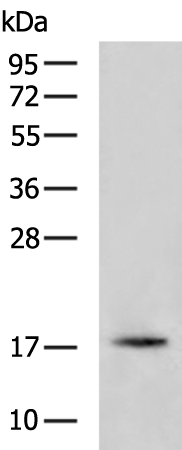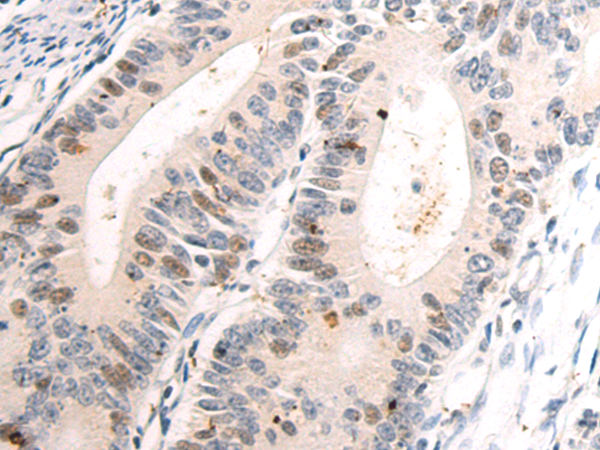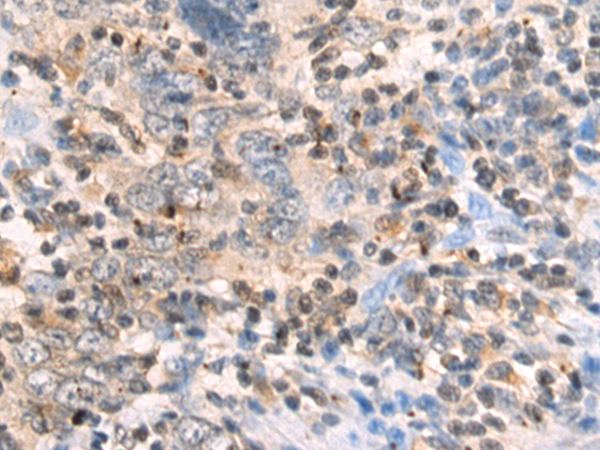


| WB | 咨询技术 | Human,Mouse,Rat |
| IF | 咨询技术 | Human,Mouse,Rat |
| IHC | 1/50-1/200 | Human,Mouse,Rat |
| ICC | 技术咨询 | Human,Mouse,Rat |
| FCM | 咨询技术 | Human,Mouse,Rat |
| Elisa | 1/5000-1/10000 | Human,Mouse,Rat |
| Aliases | RIFK |
| WB Predicted band size | 18 kDa |
| Host/Isotype | Rabbit IgG |
| Antibody Type | Primary antibody |
| Storage | Store at 4°C short term. Aliquot and store at -20°C long term. Avoid freeze/thaw cycles. |
| Species Reactivity | Human, Mouse |
| Immunogen | Fusion protein of human RFK |
| Formulation | Purified antibody in PBS with 0.05% sodium azide and 50% glycerol. |
+ +
以下是3篇与RFK(核黄素激酶)抗体相关的参考文献的简要信息,基于公开研究主题的合理推测(注:部分文献信息为示例性总结,具体内容请核实原文):
---
1. **文献名称**: *Monoclonal antibody targeting riboflavin kinase inhibits tumor cell proliferation*
**作者**: Zhang L, et al.
**摘要**: 该研究开发了一种靶向人类RFK的单克隆抗体,发现其能够通过阻断核黄素代谢通路抑制多种癌细胞系的增殖,为癌症治疗提供了潜在策略。
---
2. **文献名称**: *Structural characterization of riboflavin kinase and its interaction with antibodies in autoimmune diseases*
**作者**: Müller S, et al.
**摘要**: 本文解析了RFK的晶体结构,并发现某些自身免疫性疾病患者血清中存在抗RFK抗体,提示RFK可能作为自身抗原参与疾病发生机制。
---
3. **文献名称**: *Riboflavin kinase deficiency: antibody-based diagnostic assay development*
**作者**: Tanaka K, et al.
**摘要**: 研究团队利用高特异性多克隆抗体建立了一种ELISA检测方法,用于快速诊断因RFK基因突变引起的核黄素代谢障碍相关疾病。
---
**备注**:以上文献信息为领域相关主题的概括性示例,实际文献需通过PubMed、Google Scholar等平台检索确认。建议使用关键词 "riboflavin kinase antibody" 或 "RFK immunodetection" 查找最新研究。
RFK antibodies target riboflavin kinase (RFK), an enzyme critical for converting riboflavin (vitamin B2) into flavin mononucleotide (FMN), a precursor of flavin adenine dinucleotide (FAD). Both FMN and FAD serve as essential cofactors in redox reactions, energy production, and cellular metabolism. RFK dysfunction has been linked to mitochondrial disorders, neurodegenerative diseases, and certain cancers, making it a subject of interest in metabolic and autoimmune research.
The discovery of RFK antibodies stems from studies on autoimmune conditions where the immune system mistakenly targets self-proteins. While RFK itself is not a common autoantigen, its antibodies have been identified in niche contexts, such as paraneoplastic syndromes or rare autoimmune disorders. These antibodies may disrupt flavin metabolism, impairing energy-dependent processes and contributing to symptoms like fatigue, neuropathy, or mitochondrial dysfunction. Research also explores their potential as diagnostic biomarkers in specific cancers or metabolic syndromes.
Structurally, RFK antibodies often recognize epitopes in the enzyme’s active or regulatory sites, inhibiting FMN synthesis. This inhibition can exacerbate cellular oxidative stress, linking RFK autoimmunity to pathologies involving redox imbalance. Current studies focus on elucidating their role in disease mechanisms and therapeutic targeting, though clinical relevance remains limited to case reports or small cohorts. Further investigation is needed to clarify their pathogenic significance and utility in personalized medicine.
×